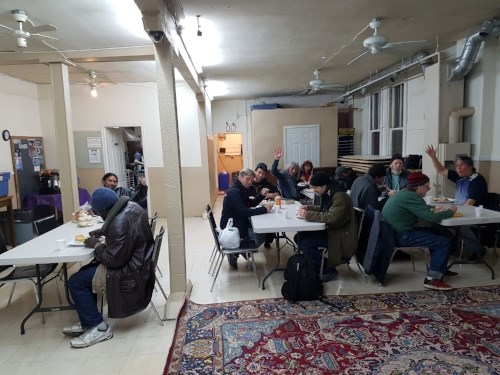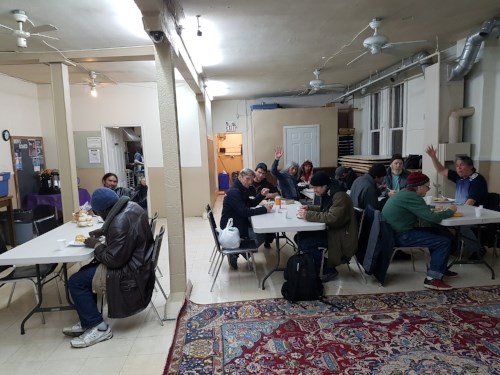 A few weeks from now, an old brick pile on Vancouver’s Downtown East Side will come crashing down to make way for a new development next to Pigeon Park. You may hear concerns about the loss of a piece of Vancouver’s history (it was built right after the Great Vancouver Fire of 1886) or continued gentrification of the DTES; but it also means Gospel Mission has to vacate. For 90 years, Gospel Mission has provided basic human needs in the area. One of those needs is food, of course: dinners are served on most nights of the week; and since 2008, The Lord’s Rain has provided showers for people. But during the years I was assistant pastor there, it became apparent that the Mission and others like it fulfill another basic human need: a desire to be right with God
A few weeks from now, an old brick pile on Vancouver’s Downtown East Side will come crashing down to make way for a new development next to Pigeon Park. You may hear concerns about the loss of a piece of Vancouver’s history (it was built right after the Great Vancouver Fire of 1886) or continued gentrification of the DTES; but it also means Gospel Mission has to vacate. For 90 years, Gospel Mission has provided basic human needs in the area. One of those needs is food, of course: dinners are served on most nights of the week; and since 2008, The Lord’s Rain has provided showers for people. But during the years I was assistant pastor there, it became apparent that the Mission and others like it fulfill another basic human need: a desire to be right with God
It’s human nature: we recognize we can’t control a lot of things, so we spend time and energy trying not to enrage a Higher Power. A Mission’s primary function, then, is to remind people how much God loves them. Many of the people I met were searching for confirmation that no matter how much they had screwed-up in this life, God had not forsaken them.
I was struck by how many people knew the Bible – particularly Indigenous people, even those who had suffered abuse “in the name of the Lord” in residential schools: they would talk about Jesus or ask for prayer. Through the darkness of their experience, they saw a nugget of truth to hold onto.
“If a brother or sister is naked and destitute of daily food, and one of you says to them, ‘Depart in peace, be warmed and filled,’ but you do not give them the things that are needed for the body, what does it profit? Thus also faith by itself, if it does not have works, is dead.” (James 2:15-17 NKJV)
The converse is also true: you can give someone a sandwich, or a cup of coffee and they’ll be fed for the moment, but then what? If you add a word, that they have value in God’s eyes, they’ll still have that hope the next time they’re hungry and cold.
I’ve seen people whose lives have turned around, thanks to a Mission. Some have gone on to “worldly” success; some go into ministry and lift up others; some may still have “issues”, but their lives have hope. When Barry Babcook, long-time pastor at Gospel Mission, died five years ago, one fellow, Bobby, told how he was on the verge of suicide and came to talk to Barry in his office. I don’t know what was said (knowing Barry, it probably started with, “Jesus loves you”, and went from there), but Bobby found a new reason to stay alive.
That conversation involved trust – the result of relationship-building. Whether it’s a big operation like Union Gospel Mission or smaller places like Gospel Mission, Living Waters or Street Church/First Nations Bible College, the people who serve are in it for the long haul, earning people’s trust.
As of this writing, it’s not confirmed where Gospel Mission will go next. Its history is one of being in the right place, beforethe right time: it was founded in 1929, just before the Great Depression, and moved to bigger digs as World War Two was ending and more people would need it; the Lord’s Rain was funded and running just before the world economy tanked in 2008. Wherever it goes, it will be exactly where it’s supposed to be, providing that greatest of Basic Human Needs.
 Drew Snider is a writer and former broadcaster who pastored for ten years on Vancouver's Downtown East Side. He's an occasional guest speaker at churches and writes a blog, "Two Minutes for Cross-Checking!"
Drew Snider is a writer and former broadcaster who pastored for ten years on Vancouver's Downtown East Side. He's an occasional guest speaker at churches and writes a blog, "Two Minutes for Cross-Checking!"
You can read more articles on our interfaith blig, Spiritually Speaking, HERE
* This article was published in the print edition of the Times Colonist on Saturday, April 13th 2019



